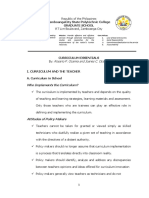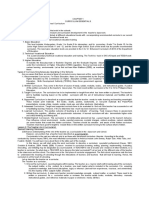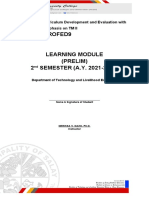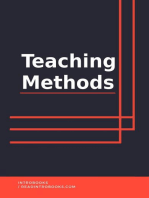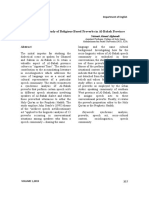Assignment
Assignment
Uploaded by
EMMANUEL ROBINSONCopyright:
Available Formats
Assignment
Assignment
Uploaded by
EMMANUEL ROBINSONOriginal Description:
Copyright
Available Formats
Share this document
Did you find this document useful?
Is this content inappropriate?
Copyright:
Available Formats
Assignment
Assignment
Uploaded by
EMMANUEL ROBINSONCopyright:
Available Formats
NAME: UGHEGBE COLUMBUS OTHUKE
MATRIC NUMBER: 20185111034
DEPARTMENT: PSYCHOLOGY EDUCATION (PGDE)
COURE TITTLE: CURRICULUM INSTRUCTIONAL DEVELOPMENT
COURSE CODE: PDE 617
ASSIGNMENT
Curriculum for non-professional teachers in the school system. As a principal
of a school, five teachers have been posted to your school, Design three
weeks Curriculum for them.
Three Weeks curriculum for non-professional teachers in the school system.
Curriculum is the overall guiding document of the programme of instruction.
The curriculum is the comprehensive package of learning experiences
required for learning in a formal system of education. The curriculum is made
up of the subject matter or content of courses and the instructional strategies
to be adopted in achieving the goals of the programme.
INTRODUCTION
Human ability to work effectively and efficiently is a potent tool for survival.
With work, an individual is prepared to face the challenges of life. Education
therefore is a veritable means of preparing people for productive work.
However, when the system fails like ours today the young graduates from
universities and polytechnics who had no previous training in teaching but
wishes to be or already practicing teaching so as to sustain themselves
without teaching qualification, need education (pedagogy of teaching) so that
they can match up with the trained ones.
TEACHING: Is “the promotion of learning”. The teacher in his work of
teaching must provide appropriate conditions for learning. Teaching can also
be defined as helping other people to learn. Teaching is act of imparting
knowledge. It is knowing what to teach the learners and ways of imparting
the knowledge in the most effective way possible. Is a way a teacher guides
the learners in acquisition of knowledge, skill and attitudes. It is system of
interaction involving the teacher, the learner and the learning materials.
HISTORICAL DEVELOPMENT OF TEACHING IN NIGERIA
Teaching is an old craft. With the need to formalize education, it became a
job open to all that have some expertise to share with others. During the
early years of teaching, anybody at all could be called upon to teach. In fact
many of the teachers were practicing a trade and early teacher training
colleges hoped to build a profession out of their practice.
With the coming of the British into Nigeria, they established the typical
Missionary school. The curriculum and programme were alien to the societies
they were located therein. The products were to serve the missionaries and
colonial Masters of the time. Historically, the process of teaching has been
regarded in three different ways. They are unitary dyadic and Triadic Process.
OBJECTIVE OF NON-PROFESSIONAL TEACHERS CURRICULUM
1. Provide background Orientation and experience for non-professional
teachers
2. Provide knowledge of the teaching profession
3. Enhance the non-professional teacher’s ability to identify various
opportunities.
4. Promote the educational (Teaching) institution.
5. Increase Curriculum relevance for education.
6. Maximize the creative potential for learning.
7. Reduce discrepancies between non-professional teachers and
professional teachers.
CONTENTS OF NON-PROFESSIONAL TEACHER CURRICULUM
The Content area of non-professional teacher Curriculum should emphasize
the knowledge on the following topics or courses relevant to equip them with
the pedagogy of teaching professional.
1. Philosophy of Education: Intended for teachers to know the
philosophical basis of teaching learning processes. Major questions of
concern in this course are: Who am I as a person? What do we teach?
Why education? How is education? How is education going to be
distributed? etc.
2. Education Psychology: Intended to give teachers an in-depth
analysis of how children grow and develop for the purpose of teaching
them according to their differential needs, how learning take place, how
to motivate a learner, how to provide for the difference that exist within
learners etc.
3. Sociology of Education: To provide teachers with in-depth
sociological issues as it relates to education and teaching-learning
situations. Major concerns are: the teacher and how to relate to the
society, teacher-teacher interaction and student-teacher interaction.
4. Evaluation: Principles of measurement and evaluation are taught to
teachers. The essence is to acquaint a training teacher with how to
measure and report the extent to which the desired educational goals
are or not obtained by the learners.
Other area includes:
5. Educational administration
6. Research
7. Curriculum development
8. History of education
9. Micro teaching/teaching practice
10. Measurement and evaluation etc.
TIME TABLE
Time 8 – 10 10 – 12 12 – 1 1-2
Mon. Philosophy of History of Education
Education Administration
Education
Tues.
Break
Education Measurement and Educational
Evaluation Technology
Psychology
Wed. Sociology of Introduction of
Teaching
Education Profession
Thurs.
Curriculum Philosophy of
Development Education
Fri. Statistics Research Method Micro Teaching
LEARNING ACTIVITIES
Learning activities for non-professional teachers Curriculum are the activities
the learners are to do in the process of learning the content of the
Curriculum. The students passing through the training should be given the
learning activities relating to each topic in the subject-matter using their field
of specialization as a case study. In this regard they should be encouraged to
design how they could go about their teaching profession in the course of
their programme.
The pedagogical approaches to the teaching and learning of the content are
given below:
Scheme of work:
The scheme of work is a weekly/termly breakdown of syllabus for meaningful
instructional programme. It is the sequential arrangement of the content of
the syllabus to show the age/ability and progression of learner.
Often, the scheme consists of item number in sequence, topic, objectives,
strategies instructional materials, class activities, evaluation and remarks.
Lesson Plan:
This is the outline of the content and strategies to be used by the teacher in
the course of achieving a lesson. Lesson plan is important for the following
reasons:
1. Periods will be devoted to a topic.
2. The plan shows orderliness and sequential arrangement of the content
and procedure for teaching.
3. It is often better to plan series of lessons in sequence rather than
disjoint pieces.
4. The materials can be seen as whole rather than isolated pieces.
Vital Questions to ask when preparing a lesson plan are:
What is to be taught (the content)?
To whom is the subject Matter to be taught? (The learner)?
Where is the subject matter to be taught (Methodology)?
Where is to be taught (Laboratory, field work and normal classroom)?
For how long (Time to use)?
The Lesson Note:
The Lesson note is a resume of what is to be done in a lesson. It is a guide.
In most cases it is written in steps, representing procedure while the content
is in outline form. The Lesson note should not be sketchy and not to run into
several pages that look unwidely to handle. Essentially a number of sections
important in the lesson note.
1. Preliminary information
Teacher’s name: Time/Periods:
School: Date:
Learners’ age:
Subject:
Topic:
2. Previous Knowledge 6. Evaluation
3. Introduction or Step 1 7. Assignment
4. Presentation or Step 2 8. Teacher’s Remark
5. Conclusion
Some Teaching Methods:
1. Field trip method 4. Discussion method
2. Play away method 5. Story telling method etc.
3. Dramatization method
These different methods make the lesson active, interesting and permanent.
Evaluation:
Evaluation of the curriculum of non-professional teachers has to do with the
determination of the worth of the programme against its objectives. The
forms of evaluation should not be totally examination-oriented but also micro
teaching to know how much they have grab what is been taught and the
pedagogy of teaching. Although examination still plays a major role in
determining performance in the present day schooling.
Conclusion:
Today, more than ever before, it is the responsibility of the educational
system to make learning in schools at all levels a preparation for useful living.
In the same way, the economic prosperity of graduating youths in the society
would be hastened and enhanced. If the curriculum been discussed is
conceived, designed and adequately implemented, will definitely make the
non-professional teachers to be competent both in private and public schools.
You might also like
- Real Life Sociology A Canadian Approach 2Nd Edition Full ChapterDocument41 pagesReal Life Sociology A Canadian Approach 2Nd Edition Full Chapterpatsy.brown860100% (29)
- Educ 213 The Teacher and The School Curriculum ReviewerDocument4 pagesEduc 213 The Teacher and The School Curriculum ReviewerMariel Depaudhon100% (1)
- Dimensions and Principles of Curriculum DesignDocument6 pagesDimensions and Principles of Curriculum DesignJo Nerak Bayudo Lupeba64% (14)
- Effective Teaching Strategies of Bulacan State University - Sarmiento CampusDocument51 pagesEffective Teaching Strategies of Bulacan State University - Sarmiento CampusPerry Arcilla SerapioNo ratings yet
- Module On Elec 311 - Principles and Methods of Teaching Accounting (Final)Document36 pagesModule On Elec 311 - Principles and Methods of Teaching Accounting (Final)RJ Kristine Daque100% (7)
- Pedagogical StudiesDocument15 pagesPedagogical StudiesgowNo ratings yet
- Teaching AptitudeDocument6 pagesTeaching AptitudePraveen Kumar P100% (3)
- Competency #6 Ay 2022-2023 Social StudiesDocument14 pagesCompetency #6 Ay 2022-2023 Social StudiesCharis RebanalNo ratings yet
- PCC Module 1 Prof Ed 1Document3 pagesPCC Module 1 Prof Ed 1Albert Bello ObelidorNo ratings yet
- Fs 2Document10 pagesFs 2Joseph LizadaNo ratings yet
- Approaches To Curriculum Design 2Document47 pagesApproaches To Curriculum Design 2PreciousMaviSalemCarcosiaNo ratings yet
- Prelim Exam Zyrish LunaDocument3 pagesPrelim Exam Zyrish LunaMary Joy T. PuyoNo ratings yet
- Teaching Multi-Grade Classes: Topic 19. Administrative Strategies To Support Multi-Grade SchoolsDocument7 pagesTeaching Multi-Grade Classes: Topic 19. Administrative Strategies To Support Multi-Grade SchoolsMaricel Viloria100% (2)
- Facilitating Learner-Centered Teaching: ForewordDocument40 pagesFacilitating Learner-Centered Teaching: ForewordElle Villanueva VlogNo ratings yet
- Tap 201 Suleiman Muriuki Cat 1Document6 pagesTap 201 Suleiman Muriuki Cat 1Ryan PaulNo ratings yet
- EFN 3201 Handout 8 The Role of TeachersDocument5 pagesEFN 3201 Handout 8 The Role of TeachersMarsha SinghNo ratings yet
- Unit 1 Genral Method of TeachingDocument61 pagesUnit 1 Genral Method of TeachingSadam IrshadNo ratings yet
- Approaches To Curriculum DesignDocument13 pagesApproaches To Curriculum DesignRamel PaglanganNo ratings yet
- Assignment 8601Document24 pagesAssignment 8601arifiqra246100% (1)
- My Portfolio in Field Study 2 Cycle 1Document26 pagesMy Portfolio in Field Study 2 Cycle 1ELLAJEAN GALLOGONo ratings yet
- LokDocument5 pagesLokKalpana PokhrelNo ratings yet
- Prof Ed 12 JessaDocument3 pagesProf Ed 12 JessaClarizza Mae Abejo100% (1)
- FS 1 Ep5 NEODocument8 pagesFS 1 Ep5 NEORalph Lowie NeoNo ratings yet
- Content and Pedagogy PPT 221002124246 61e1cc30Document37 pagesContent and Pedagogy PPT 221002124246 61e1cc30Gladys GaleraNo ratings yet
- Curriculum EssentialsDocument17 pagesCurriculum EssentialsRosario Perez Ocamia100% (3)
- ATSIII HandOutDocument8 pagesATSIII HandOutJessica CabasaNo ratings yet
- Language Orientation Virtual EnvironmentDocument16 pagesLanguage Orientation Virtual EnvironmentZulhitjarin NasutionNo ratings yet
- ACTIVITY 1 - Curriculum Defined: Reflection #5Document9 pagesACTIVITY 1 - Curriculum Defined: Reflection #5clara dupitasNo ratings yet
- Zamboangacity State Polytechnic College Graduate SchoolDocument25 pagesZamboangacity State Polytechnic College Graduate SchoolRosario Perez OcamiaNo ratings yet
- PSSST : Silence Please!Document48 pagesPSSST : Silence Please!dharwin geronimoNo ratings yet
- Chapter 1 Modules 1 2Document9 pagesChapter 1 Modules 1 2Dan Dan SoyNo ratings yet
- CDE PrelimDocument12 pagesCDE Prelimmarlo balatNo ratings yet
- Local Media1492025059456415376Document8 pagesLocal Media1492025059456415376Jinky JunioNo ratings yet
- Professional Development of Mathematics Teachers: Lifelong EducationDocument16 pagesProfessional Development of Mathematics Teachers: Lifelong Educationhaka_ika100% (1)
- Semi Final Special Topic 1Document8 pagesSemi Final Special Topic 1viancakesdumpNo ratings yet
- Curriculum ImplementationDocument16 pagesCurriculum ImplementationMiriam SurigaoNo ratings yet
- National Curriculum Framework For Teacher Education 12.5.22Document17 pagesNational Curriculum Framework For Teacher Education 12.5.22laxmiramGopeNo ratings yet
- CURRICULUMDocument6 pagesCURRICULUMIhsanaNo ratings yet
- Curriculum DesignDocument16 pagesCurriculum DesignBernadeth Bonecile100% (3)
- Chapter 2 Effective Procedures in Teaching Science FinalDocument10 pagesChapter 2 Effective Procedures in Teaching Science FinalJasmine Nicole OsallaNo ratings yet
- Educational Models and ParadigmsDocument109 pagesEducational Models and ParadigmsJoan MakilingNo ratings yet
- Papersbbn PDFDocument297 pagesPapersbbn PDFprashantha shenoyNo ratings yet
- 2ND - Teaching AccountingDocument19 pages2ND - Teaching AccountingPHILL BITUIN100% (1)
- Ed 301 - The Teacher and The School CurriculumDocument5 pagesEd 301 - The Teacher and The School CurriculumRoland Jr100% (1)
- Output#5. Lesson 2 - Activity 1, Analysis & EnrichmentDocument3 pagesOutput#5. Lesson 2 - Activity 1, Analysis & EnrichmentJonathan RacelisNo ratings yet
- Purposeful. The Teacher Clear Understaning of Students Behavior Will in Effect Help LearnersDocument5 pagesPurposeful. The Teacher Clear Understaning of Students Behavior Will in Effect Help LearnersGeorgia RamirezNo ratings yet
- Crafting The Curriculum: Dimensions and Principles of Curriculum DesignDocument64 pagesCrafting The Curriculum: Dimensions and Principles of Curriculum DesignAntoinette San JuanNo ratings yet
- EDT 308 Lecture Note 2023-2024Document16 pagesEDT 308 Lecture Note 2023-2024realbigsam107No ratings yet
- Course Code 8626 No-2Document12 pagesCourse Code 8626 No-2Shakeel BalochNo ratings yet
- Basic Knowledge of CurriculumDocument20 pagesBasic Knowledge of CurriculumfazaNo ratings yet
- FS 1 Episode 5 Baranquil MarieJustineDocument16 pagesFS 1 Episode 5 Baranquil MarieJustineMarie Justine BaranquilNo ratings yet
- Special Topics in EducationDocument25 pagesSpecial Topics in EducationMea Adelaine MatagaNo ratings yet
- I. Curriculum Essentials Curriculum DefinitionDocument5 pagesI. Curriculum Essentials Curriculum DefinitionMyleneNo ratings yet
- Curriculum EssentialsDocument48 pagesCurriculum EssentialsClauditte SaladoNo ratings yet
- ProfEd609 Chapter 1Document25 pagesProfEd609 Chapter 1SHYRENE KAYE ALLADONo ratings yet
- Curriculum and The TeacherDocument5 pagesCurriculum and The TeacherMR. MBENJENo ratings yet
- PrintDocument7 pagesPrintRc ChAnNo ratings yet
- Module 7 Week 12Document8 pagesModule 7 Week 12AGNES TUBOLANo ratings yet
- MODULE 03. Approaches and Curriculum Development Process and ModelsDocument4 pagesMODULE 03. Approaches and Curriculum Development Process and ModelsCharlene A. BoNo ratings yet
- Classroom-Ready Resources for Student-Centered Learning: Basic Teaching Strategies for Fostering Student Ownership, Agency, and Engagement in K–6 ClassroomsFrom EverandClassroom-Ready Resources for Student-Centered Learning: Basic Teaching Strategies for Fostering Student Ownership, Agency, and Engagement in K–6 ClassroomsNo ratings yet
- 173175-Article Text-443863-1-10-20180615Document15 pages173175-Article Text-443863-1-10-20180615EMMANUEL ROBINSONNo ratings yet
- Ehs 3 82Document11 pagesEhs 3 82EMMANUEL ROBINSONNo ratings yet
- Ijsrp p9070Document10 pagesIjsrp p9070EMMANUEL ROBINSONNo ratings yet
- Basil 5Document7 pagesBasil 5EMMANUEL ROBINSONNo ratings yet
- Theories of Semantics Merits and LimitatDocument9 pagesTheories of Semantics Merits and LimitatEMMANUEL ROBINSONNo ratings yet
- 1987 3921 1 SM1Document9 pages1987 3921 1 SM1EMMANUEL ROBINSONNo ratings yet
- Constructivism Full WorkDocument76 pagesConstructivism Full WorkEMMANUEL ROBINSONNo ratings yet
- ISJv20p083 097maheshwari3491Document15 pagesISJv20p083 097maheshwari3491EMMANUEL ROBINSONNo ratings yet
- 2022 PUTME AdvertDocument2 pages2022 PUTME AdvertEMMANUEL ROBINSONNo ratings yet
- POST UTME Payment SlipDocument1 pagePOST UTME Payment SlipEMMANUEL ROBINSONNo ratings yet
- WorksheetDocument2 pagesWorksheetEMMANUEL ROBINSONNo ratings yet
- 124684-Article Text-340180-1-10-20151027Document11 pages124684-Article Text-340180-1-10-20151027EMMANUEL ROBINSONNo ratings yet
- OrduandAkpomi2009 ModernOfficeDocument8 pagesOrduandAkpomi2009 ModernOfficeEMMANUEL ROBINSONNo ratings yet
- 1 PBDocument11 pages1 PBEMMANUEL ROBINSONNo ratings yet
- Sociolinguisticanalysisoftheuseofproverbsin MbaiseDocument26 pagesSociolinguisticanalysisoftheuseofproverbsin MbaiseEMMANUEL ROBINSONNo ratings yet
- Discourage Suicide, Death Is CertainDocument2 pagesDiscourage Suicide, Death Is CertainEMMANUEL ROBINSONNo ratings yet
- A Pragmatic Study of Selected Religious Posters in NigeriaDocument14 pagesA Pragmatic Study of Selected Religious Posters in NigeriaEMMANUEL ROBINSONNo ratings yet
- 139-147 Christopher Nwabudike A Sociolinguistic Analysis of Proverbs in Ola RotimisDocument9 pages139-147 Christopher Nwabudike A Sociolinguistic Analysis of Proverbs in Ola RotimisEMMANUEL ROBINSONNo ratings yet
- TTAIP Volume1 Issue1 Page357 384Document28 pagesTTAIP Volume1 Issue1 Page357 384EMMANUEL ROBINSONNo ratings yet
- Ethnographic Implications of Teaching Literature in A Foreign Language ClassroomDocument2 pagesEthnographic Implications of Teaching Literature in A Foreign Language ClassroomEMMANUEL ROBINSONNo ratings yet
- Speech Act Analysis of An Excerpt From Ngugi Wa Thiongo and Micere Githae Mugo (1Document5 pagesSpeech Act Analysis of An Excerpt From Ngugi Wa Thiongo and Micere Githae Mugo (1EMMANUEL ROBINSONNo ratings yet
- A Pragmatic Analysis of Selected Newspapers ObituariesDocument9 pagesA Pragmatic Analysis of Selected Newspapers ObituariesEMMANUEL ROBINSONNo ratings yet
- Conceptual Framework CITE Group 4Document6 pagesConceptual Framework CITE Group 4Kathleen GuevarraNo ratings yet
- Aktu One View by Aktu SDC - pdf2006480100031Document6 pagesAktu One View by Aktu SDC - pdf2006480100031rakesh15mathNo ratings yet
- Nat Reviewer PhilosophyDocument6 pagesNat Reviewer Philosophybertz sumayloNo ratings yet
- 10 Literature ReviewDocument11 pages10 Literature ReviewJazz EsquejoNo ratings yet
- DLL-2nd Quarter - wk10Document6 pagesDLL-2nd Quarter - wk10BONBON ELIONo ratings yet
- Academic ReadingDocument4 pagesAcademic ReadingMhmd HaekalNo ratings yet
- LO3, LO4 - Report (Assignment Guidance)Document11 pagesLO3, LO4 - Report (Assignment Guidance)ruth maneesha0% (1)
- Confusion MatrixDocument6 pagesConfusion MatrixamirNo ratings yet
- Work Engagement: A Meta-Analysis Using The Job Demands-Resources ModelDocument38 pagesWork Engagement: A Meta-Analysis Using The Job Demands-Resources ModelKhizer KhanNo ratings yet
- Ri - Kid QarDocument2 pagesRi - Kid QarqumaisthegreatNo ratings yet
- Module 6 Decision-Making PDFDocument10 pagesModule 6 Decision-Making PDFMahua Adak MandalNo ratings yet
- CV ATS AndriDocument2 pagesCV ATS AndriAngira26No ratings yet
- تحليل نموذجيDocument34 pagesتحليل نموذجيMohamed ZaiourNo ratings yet
- This Study Resource Was: SCI-M 3114 Teaching Science in The Elementary GradesDocument8 pagesThis Study Resource Was: SCI-M 3114 Teaching Science in The Elementary Gradesjade tagabNo ratings yet
- Group 7 - Behaviorism: 1. Why Should We Study The Theories of Learning?Document43 pagesGroup 7 - Behaviorism: 1. Why Should We Study The Theories of Learning?Lộc Phan ThanhNo ratings yet
- How Do You Change Your Company CultureDocument5 pagesHow Do You Change Your Company CultureWilliam FosterNo ratings yet
- Research NAM0Document23 pagesResearch NAM0Jennifer BlasingNo ratings yet
- The Roles of The Media in Human Daily LifeDocument4 pagesThe Roles of The Media in Human Daily LifeNghiem Thi QuyênnNo ratings yet
- An Evaluationof Hand HygieneDocument8 pagesAn Evaluationof Hand HygieneMusa ZiramiNo ratings yet
- 06 Open Scholarshiphive Italian UniversitiesDocument9 pages06 Open Scholarshiphive Italian UniversitiesWaseem AjmalNo ratings yet
- 6th Maths Lesson PlanDocument5 pages6th Maths Lesson PlanPriyanka GuptaNo ratings yet
- ShodhSanchar2 PhanseChavanCDocument6 pagesShodhSanchar2 PhanseChavanCGeffrey S. QuilalaNo ratings yet
- Writing To Learn (Pre-Reading) - (Literacy Strategy Guide)Document8 pagesWriting To Learn (Pre-Reading) - (Literacy Strategy Guide)Princejoy ManzanoNo ratings yet
- Correctly Identification of PatientDocument9 pagesCorrectly Identification of PatientHezekiah AtindaNo ratings yet
- Conservation, Restoration AND Re-Adaptation: Submitted by - Devi Baruah Bid 4 Year 180473Document8 pagesConservation, Restoration AND Re-Adaptation: Submitted by - Devi Baruah Bid 4 Year 180473Srishti JainNo ratings yet
- Decriminalization: A Proposed Theory of Change For Improved Community Safety and Wellbeing OutcomesDocument32 pagesDecriminalization: A Proposed Theory of Change For Improved Community Safety and Wellbeing OutcomesCTV CalgaryNo ratings yet
- Factors Affecting The Successful Implementation of ICT Projects in Government-With-Cover-Page-V2Document11 pagesFactors Affecting The Successful Implementation of ICT Projects in Government-With-Cover-Page-V2Banjani KalansooriyaNo ratings yet
- Social and Cultural Mobility Pitrim Sorokin Chapter 1Document19 pagesSocial and Cultural Mobility Pitrim Sorokin Chapter 1HARSH VARDHANNo ratings yet
- Social Loafing and FacilitationDocument21 pagesSocial Loafing and Facilitationjanagyrama1No ratings yet
























